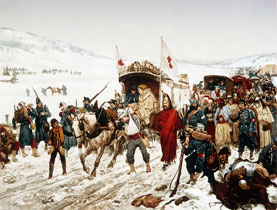
Swiss proud of their humanitarian tradition

For hundreds of years Switzerland has offered asylum to victims of political and religious persecution. This humanitarian tradition has become part of the country's identity.
In recent years the legacy of this humanitarian tradition has been claimed by both sides of the political debate on a more restrictive asylum policy.
When Huguenots and Waldenses were persecuted for their faith in 16th and 17th century France, several thousand people fled to Switzerland and found acceptance in the Protestant cantons, particularly in Geneva.
It was reported that King Louis XIV was very angry about Switzerland’s generosity to asylum seekers.
But after 1792, French royalists persecuted by the Revolution were also taken in by Switzerland. In the 19th century in particular Switzerland became renowned as a country of asylum. The numbers of political refugees admitted to Switzerland increased after the country’s neutrality was officially underwritten by the great European powers in 1815.
Among these refugees were liberals from Germany, Polish insurgents against Russian rule and socialists and anarchists from all over Europe. They were tolerated as long as they caused no trouble.
Dunant and the Red Cross
The 19th century also saw the creation of another important element of Switzerland’s humanitarian tradition, the founding of the Red Cross in Geneva in 1863.
During a business trip in 1859, the Geneva businessman Henry Dunant witnessed the horrific aftermath of the Battle of Solferino in modern day Italy. France was fighting on the side of Piedmont-Sardinia against Austria. He recorded his memories and experiences in a book which became the inspiration for the creation of the Red Cross.
In “A Memory of Solferino” Dunant outlined how the suffering of the soldiers and civilian population in war could be alleviated. He campaigned througout Europe and his ideas gained acceptance. On February 17, 1863, Dunant joined the members of the Geneva Society for Public Welfare in founding an international committee of societies for care of the wounded.
The organisation took on the name International Committee of the Red Cross (ICRC) in 1876. As a non-party, neutral and independent organisation, the ICRC has since then looked after the wellbeing of civilian victims, wounded soldiers and prisoners in countless conflicts. Most of its SFr1 billion annual budget (2006) comes from Switzerland.
Controversial wartime role
In the 20th century Swiss asylum policy changed in the face of changing history. The role of Switzerland in the Second World War proved to be controversial. The neutral state has been criticised in particular for turning away Jewish refugees at its borders. Up to 1944 Jews were not treated as political refugees but as “refugees on racial grounds”, which meant they did not qualify for admission into Switzerland.
After the war, Switzerland returned to a more generous admission policy. Large groups of refugees, particularly from communist states, were granted asylum. In 1956 Switzerland offered permanent asylum to some 7,000 people who fled Hungary after the uprising there. In 1968 12,000 refugees from Czechoslovakia were also admitted.
Some 2,500 Poles sought refuge in Switzerland after martial law was imposed in Poland in 1981. This comparatively generous asylum policy came to an end after the fall of communism in Eastern Europe. Those who now seek asylum in Switzerland are more quickly suspected of having left their countries “only” for economic rather than political reasons.
Asylum law revisions
Swiss asylum law has been revised several times since the 1980s. The thrust of these revisions has been to make Switzerland a less attractive country for asylum seekers. In debates on the issue the country’s humanitarian tradition is freely invoked both by the government, which is seeking a more restrictive asylum policy, and by those who advocate a more liberal regime.
The different interpretations of Switzerland’s asylum policy were clearly illustrated in the referendum of autumn 2006. The cantonal and federal authorities, which were promoting a tightening of asylum law, campaigned under the slogan “Protect the humanitarian tradition of Switzerland – prevent abuse”.
When voters endorsed the more restrictive asylum policy, those on the losing side criticised the fact that Switzerland was departing from its humanitarian tradition. The term now has a new significance aside from its historical meaning and this controversial political dimension is bound to play a role in future asylum debates.
Switzerland’s humanitarian tradition is based on its historic role as a country that welcomes asylum seekers, and on the Red Cross, which was founded in Geneva in 1863.
In the 1900s numerous political activists from across Europe sought asylum in Switzerland.
Switzerland’s role during the Second World War has given rise to controversy: should the Swiss have taken in more Jewish asylum seekers?
In the 20th century people fleeing the former communist states of Eastern Europe sought refuge in Switzerland.
Today Switzerland has introduced tougher immigration and asylum laws, arguing that it has to defend its humanitarian tradition.

In compliance with the JTI standards
More: SWI swissinfo.ch certified by the Journalism Trust Initiative




























You can find an overview of ongoing debates with our journalists here . Please join us!
If you want to start a conversation about a topic raised in this article or want to report factual errors, email us at english@swissinfo.ch.